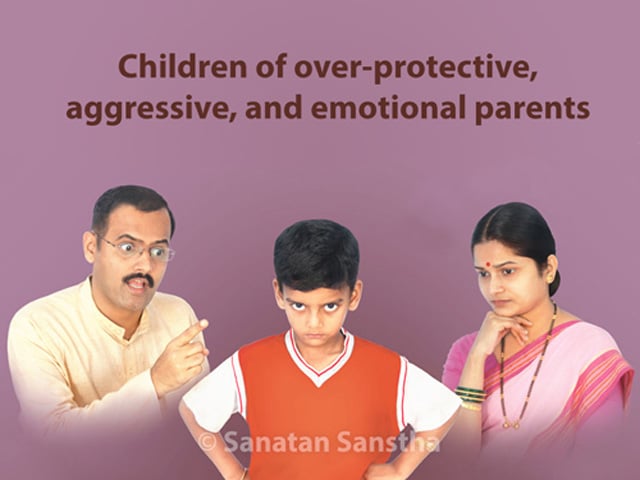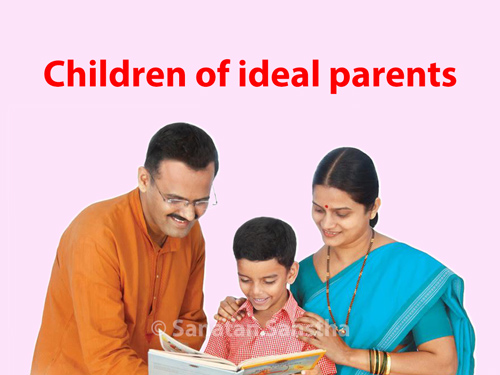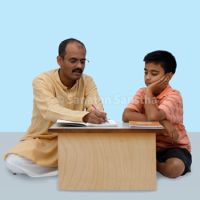Faulty Parental Attitudes can seriously harm the child’s demeanour and psychology. Some parents are not aware of its consequences and some might not even care. This article provides important guidelines about how to correct your faulty attitudes and mistakes and become reasonably good parents with parental responsibility so that the child evolves into a mature adult.
1. Faulty Parental Attitudes
A. Can children be spoil because of pampering and over protection by parents ?
The first child, the last child, the only child, the child of elderly parents, the only son or only daughter, adopted child, chronically ill child and the child with birth-defects are likely to be pampered and over-protected. An over protected child is never left alone and is not allowed to play with other children for the fear that other children may beat him. These over protected children are not allowed to play cricket or ride a bicycle or allowed to go for swimming for the fear of injury. The mother helps such child in homework also. Hence he becomes dependent on parents and turns out to be coward and timid. When his demands are not fulfilled, he develops temper tantrums. Such children turn out to be spoilt children and may develop an aggressive or rebellious tendency.
B. What are the defects in the personalities of parents ?
Many parents are immature and have their own problems and disturbed personality. Some examples are mentioned below :
-
Over-sensitive and irrational parents : Some parents are too much attached to their children and are over-sensitive. They become impatient and tense when their baby cries. They refuse even simple but important tests like routine blood count because they cannot even bear the idea of their baby being pricked. Such parents even if they are doctors, do not think rationally when it comes to their own baby though the same doctors would have advised the same blood test for their patients.
-
Parents having wrong notions and fixed ideas : A three year old, well built and well-nourished child was brought to a doctor for lack of appetite and refusal to take feeds. On examination and investigations the child was found to be healthy and growing quite well. An attempt was made to explain to the parents that the child was healthy, the child’s appetite was normal for the age and no medicines were necessary to increase the appetite. Such parents have wrong notions about the baby’s illness and they are not ready to change their ideas even if an expert tries to explain them the genuine cause of their child’s problem.
-
Over-protective parents : Some parents rush to help the child even when it is not necessary for example if the doctor asks a 10 year old child to point out the site of pain, the parents point out the site of pain. Parents with such nature request the teachers to allow a family member to accompany the child during the school trip. Children of such parents become dependent and lack in self-confidence.
-
Rejecting parents : Such parents often use phrases like, “Better if you die’, “You are a stigma to the family” and often ridicule or punish the child for no fault of his. Children of such parents slowly start hating their parents and later get involved in anti-social activities like stealing.
-
Over-emotional parents : Since early life, the children of emotional parents learn to go into temper-tantrums, if their needs are not fulfilled. Later these children waste time, become a nuisance and are not accepted by even their own age group.
-
Alcoholic parents : The child witnesses the frightening and unpredictable changes in the moods and behaviour of his alcoholic parents. The child fails to have security at home. He either becomes timid or takes to vices and becomes aggressive.
-
Divorced parents : Divorce is a shocking experience to the child, who is often used by parents as a weapon of revenge against each other. The divorced parents can still continue to be good parents and carry parental responsibility though no longer living as husband and wife.
-
Perfectionist or over-conscientious parents : These parents expect their children to keep their cupboard and rooms tidy and to carry on every minor assignment in a perfect manner. Children of such parents often get frustrated and give up attaining their goal.
C. What are the common mistakes of parents ?
-
Failing to understand a child’s mind and view point
-
Not spending time with children
-
Not developing good rapport with your children : Your children must have so much confidence in you that even if they have committed a crime, they should rush to you for protection though they are fully aware that they are likely to be punished.
-
Comparing the child with his brothers, sisters or neighbour’s child
-
Quarrelling with each other : Instead of quarreling, it is better to settle the differences of opinion mutually and tactfully in the presence of children so that they learn how to adjust & accommodate with each other.
-
Rushing to help the child even in simple matters : Every child has a creative ability. The parents should encourage him to develop his natural talents by providing him with all the opportunities and possible materials.
-
Worrying too much about the future of the child : You should enjoy and allow the child to enjoy today rather than worrying unnecessarily about his future.
-
Not answering queries of children : Children are curious and inquisitive. Parents should answer each question with interest and explain it in a simple way.
-
Imposing your views on child : Promote independent thinking in children. They should feel free to discuss their thoughts, views and differences with parents.
-
Ownership of the child : Instead of a whip, the parents should employ affection as a tool to punish the child.
-
Giving sermons on how to be a good child : An alcoholic has no right to tell his child to give up alcohol. Put into practice what you preach.
2. Ideal parents and parental responsibility
Though it is difficult to be ideal parents, it is certainly possible to become reasonably good parents with parental responsibility so that the child evolves into a mature adult. It is important to realise and correct our weak points so that we can evolve into better parents.
A. What are the characteristics of ideal parents ?
-
Rational approach : The parents relentlessly toil to care for their children because it is a reflection of their own personality. A kind mother is so because she cannot, but be kind. The kindness should not be simply an emotional outburst. It is beneficial if the kindness leads her to rational conduct.
-
Model for children : Children need parents they can be proud of. The father sets an example so that the son realises what it means to be a man in the family as well as in the society. The mother conveys to her daughter the satisfaction of being a woman, a wife and mother. The parents should be able to visualise the child’s problem through the eyes of a child.
-
Love and Company : Ideal parents enjoy the company of their children, go out of the way to give all the facilities to their children and enjoy watching their progress. An outstanding feature of parental love for a child is that it is unconditional. Even if there are no returns as in the case of an idiotic child, their affection and duties towards the child continue in an uninterrupted manner. Such love has the greatest impact on the development of the child. The child who is loved and approved is free to be himself.
-
Parental instinct and duty : Parents who have a perfect sense of parental duty without parental instinct are not attached to their children and hence their love is not unconditional. They love their children only if they are clever, obedient etc. Children do not feel free with such parents and often hate their brother or sister who is liked more by their parents.
Ideal parents must have a strong parental instinct combined with a perfect sense of parental responsibility. A well-developed parental instinct is responsible for affection, love, attachment and readiness to do anything for the sake of children. At the same time, the parental responsibility of ideal parents is to inculcate discipline and all the good qualities in the child even if they have to be harsh at times. They must teach their children difference between good and bad, right and wrong and see that their children follow the righteous path. Later, ideal parents should teach them ‘service before self’ by their own example. While carrying on their duties, ideal parents have to be very tactful and often very harsh also.
Reference : Sanatan Sanstha’s Holy text ‘Your child (1 to 12 years)’.



 Parents, develop a civilized generation!
Parents, develop a civilized generation! Ideal parents and today’s parents
Ideal parents and today’s parents Reasons for development of stress in parents
Reasons for development of stress in parents If we want ‘ideal kids’….
If we want ‘ideal kids’…. Mothers should follow Jijau’s ideals while raising their children !
Mothers should follow Jijau’s ideals while raising their children ! Parenting and the Role of Parents
Parenting and the Role of Parents